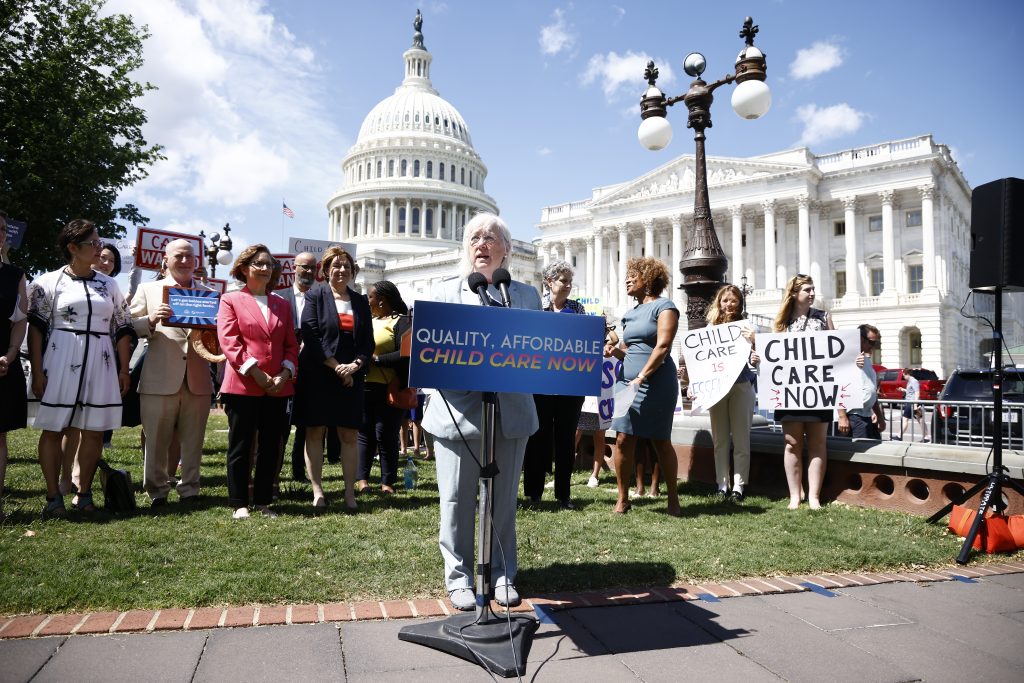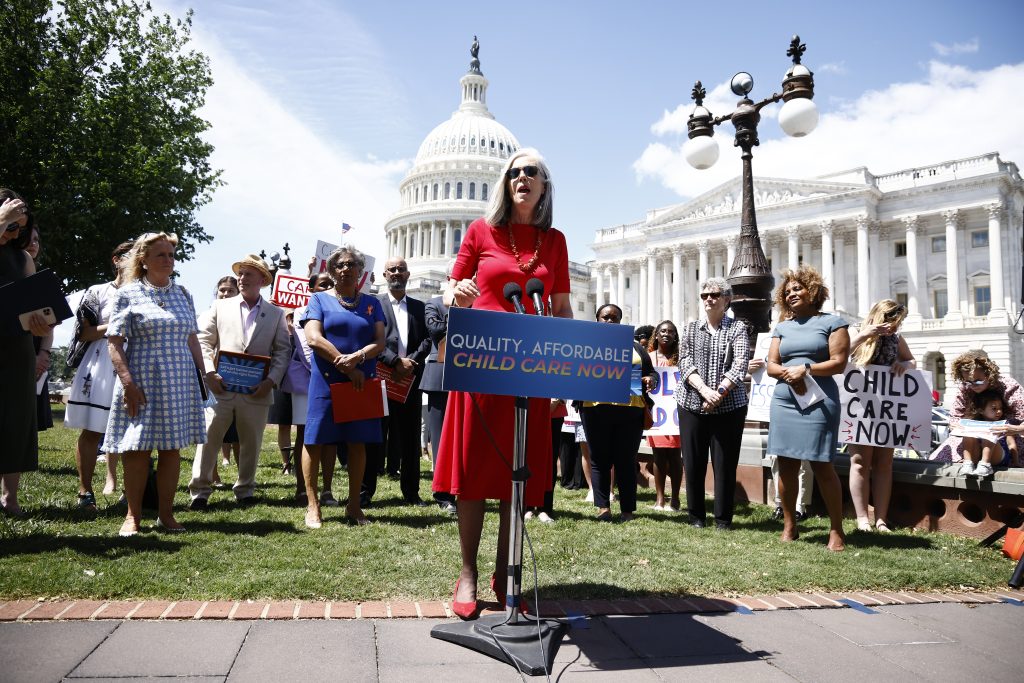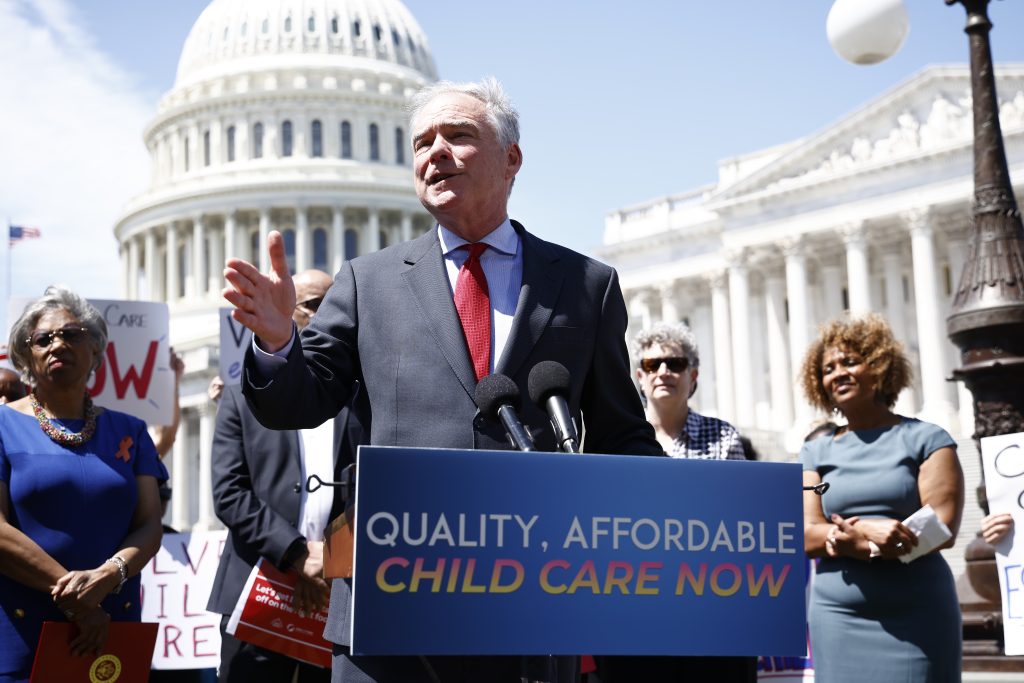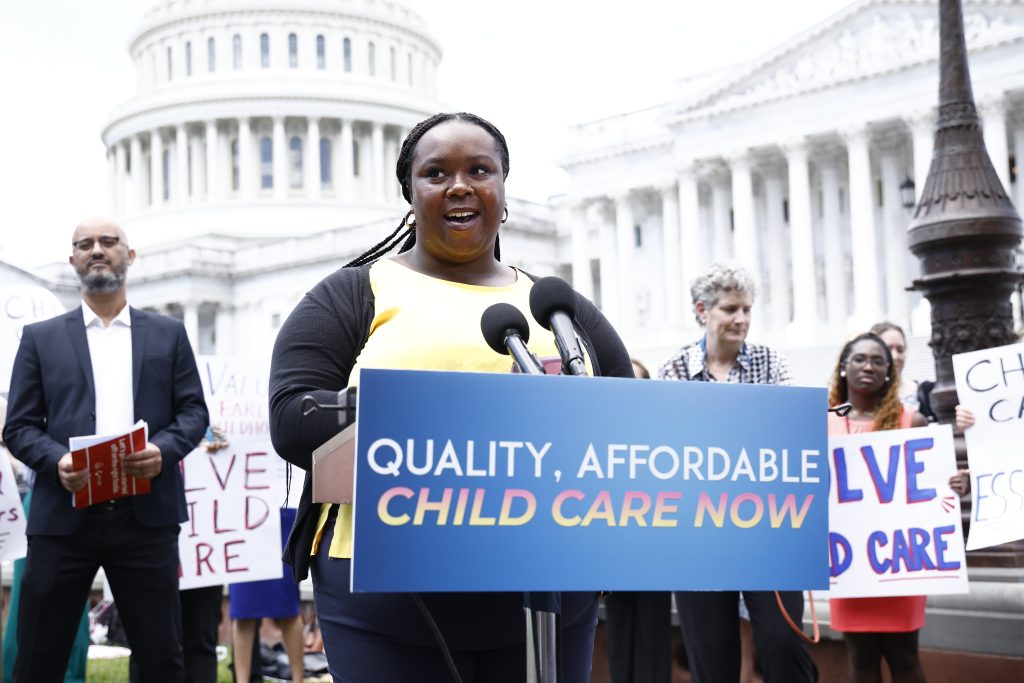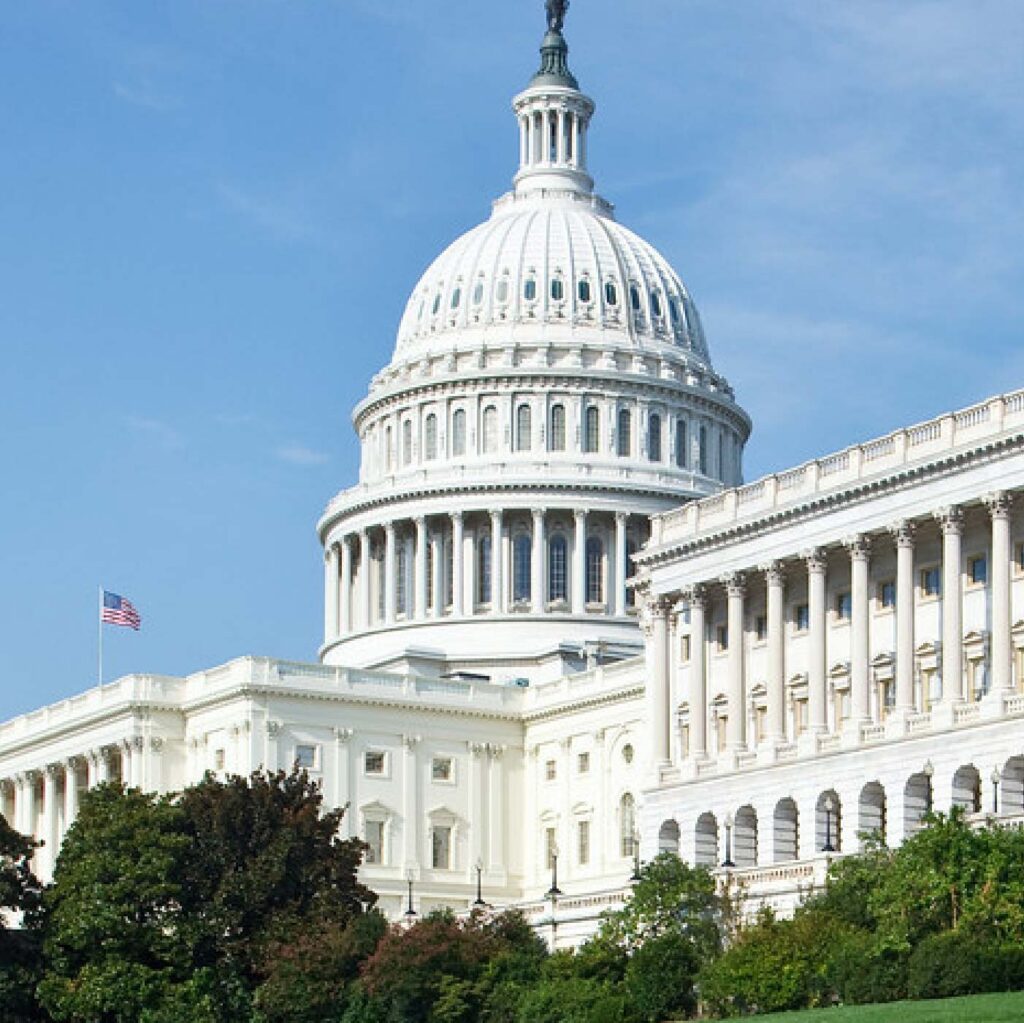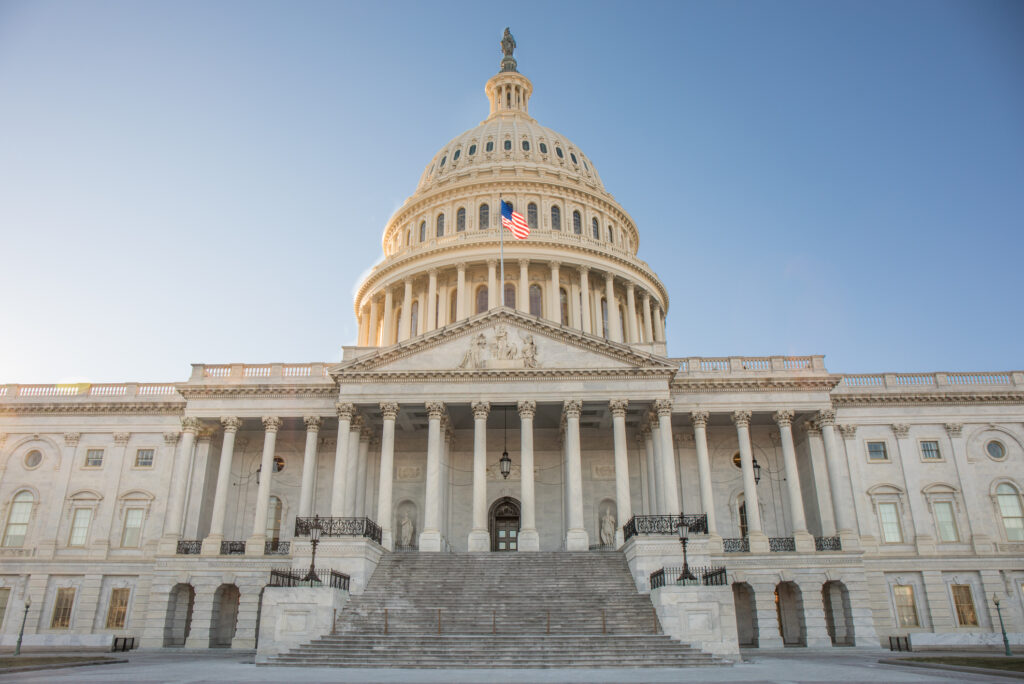Senate & House Leaders Join Advocates for Press Conference & Rally for Child Care in Reconciliation
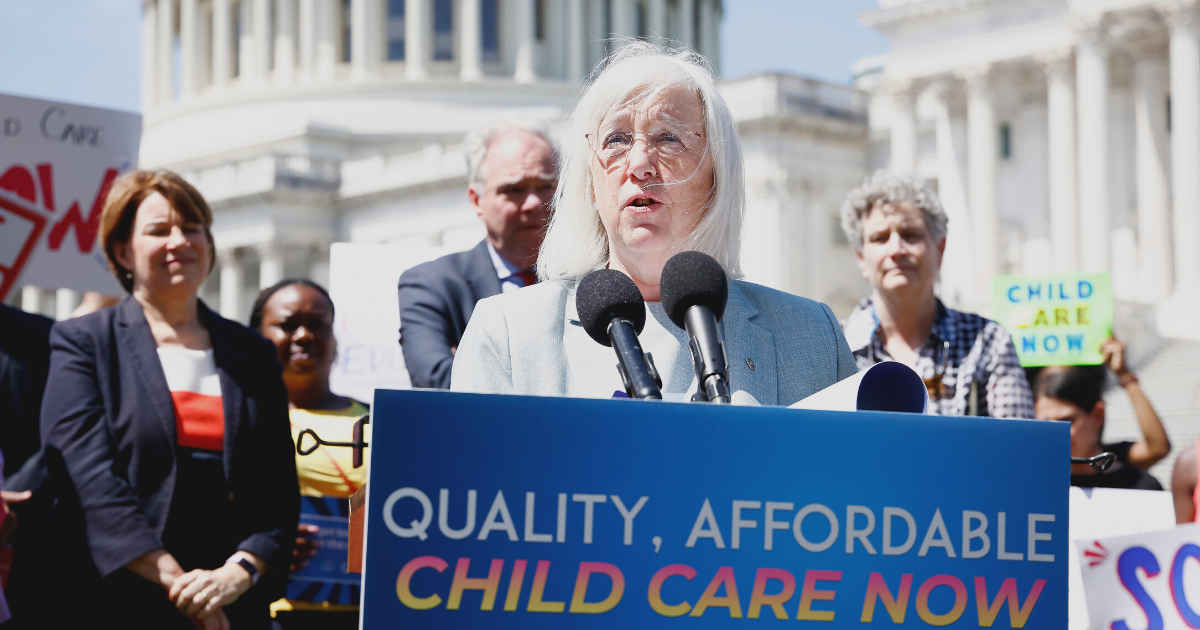
WASHINGTON, D.C. – Yesterday, more than a dozen members of the Senate and House were joined by leaders of prominent national organizations, parents, and early educators for a rally on Capitol Hill to support the inclusion of a child care proposal from Chairwoman Patty Murray (D-WA) and Sen. Tim Kaine (D-VA) in the budget reconciliation package. This streamlined child care and early learning proposal would support the child care workforce, get parents back to work, and lower costs for families. As negotiations on reconciliation move forward, there is a clear belief among a broad range of Democrats in Congress that a significant investment in America’s child care system can and must be included in this package. What’s more, voters across the country — including in key electoral states ahead of the upcoming midterms — not only support the inclusion of child care in this package; they are paying attention to how their lawmakers vote and will be unhappy if legislation passes without child care.
The event was sponsored by AFSCME, All Our Kin, Center for Law and Social Policy (CLASP), The Century Foundation, Child Care Aware of America, Child Care for Every Family Network, Community Change Action, Family Values @ Work, First Five Years Fund, MomsRising, National Association for the Education of Young Children, National Head Start Association, National Women’s Law Center, Oxfam, Save the Children, SEIU, and ZERO TO THREE.
Here’s a list of lawmakers who participated in the event, followed by quotes from speakers and organizers below:
| Sen. Patty Murray (D-WA) | Assistant Speaker Katherine Clark (D-MA) |
| Sen. Tim Kaine (D-VA) | Rep. Brenda Lawrence (D-MI) |
| Sen. Amy Klobuchar (D-MN) | Rep. Suzanne Bonamici (D-OR) |
| Sen. Mazie Hirono (D-HI) | Rep. Sara Jacobs (D-CA) |
| Sen. Sheldon Whitehouse (D-RI) | Rep. Debbie Dingell (D-MI) |
| Sen. Bob Menendez (D-NJ) | Rep. Jan Schakowsky |
Sen. Patty Murray (D-WA): “We know our child care system has not been working for a long time. It hasn’t been working for our families, our providers, or our economy. We have got to get this done through reconciliation because we cannot leave child care behind. We can’t leave our kids and our families and our moms behind. We can’t continue to shortchange our economy. As the Senate works to get a reconciliation bill to President Biden’s desk, our message is very clear: we have to fix the broken child care system before it is too late. We need child care now, and we need to put the proposal from Senator Kaine and myself into the package.”
Sen. Tim Kaine (D-VA): “Everywhere I go I hear the same story. ‘We love our child care providers, but we can’t pay them enough. Because if we pay them what they’re really worth, the families in our communities couldn’t afford care.’ That’s why this proposal is so important; it says we’re going to make an investment in CCDBG and triple the funding to help ensure children get the high-quality care they need, to ensure families can afford care, and to make sure educators are paid what they’re worth. There’s millions of people who want to be in the workforce but they’re on the sidelines instead because they can’t afford child care. This is the time to make it happen to ensure our economy can grow.”
Sen. Mazie Hirono (D-HI): “Businesses large and small are stressed because they can’t find workers, and we have child care providers who are stressed because they want to provide a service but they can’t because they can’t find employees. And parents are stressed because they can’t find affordable child care to be able to work. There is an answer, folks, and we need to pass legislation to enable this in our country. We shall persevere.”
Sen. Sheldon Whitehouse (D-RI): “Recently I went to visit Beautiful Beginnings Child Care Center in Providence. We heard what so many of my colleagues are hearing — that it is hard to keep people, hard to hire people, and they’re under intense pressure just to keep the doors open. We have to provide the support they need to be able to stay in business. We also have a huge income inequality crisis in this country, and there isn’t a thing we could do to better to address this crisis than to provide quality child care options to working families.”
Sen. Bob Menendez (D-NJ): “I’m here to urge the rest of my colleagues in the Senate to support Senator Murray and Senator Kaine’s initiative because child care is an economic and moral imperative for America and we need to get it done in reconciliation. Child care makes a difference in the lives of families, and we need to give that possibility to every family in this country. Last week, I spoke to a mom who has a small business and she needs child care to keep her business running, and her employees need child care to be able to keep working. We need to unlock the potential for our children in early learning and we need to unlock the potential to get spouses and women into the workforce. I plan to use my voice and my vote to achieve it.”
Assistant Speaker Katherine Clark (D-MA): “Access to child care is about economic and racial justice. It is about giving women the ability to provide for their families and participate in our economy. It is about paying the women – especially the women of color – a wage that allows them to provide for themselves and their children. It’s about giving our children the opportunity to learn and grow. Child care is about addressing our workforce shortage. It’s about helping the two million women who dropped out of the workforce completely during the pandemic. It’s about helping working families whose budgets are already stressed. Now we have leaders in the Senate demanding that reconciliation does not overlook child care. We will not back down. We will give our children a future that is worthy of them.”
Democratic Women’s Caucus Co-Chair Rep. Brenda Lawrence (D-MI): We must invest in our child care workers. During the pandemic we found out just how essential our child care workforce is. Investing in child care is how we unlock the full economic potential of moms and dads across the country. I spoke to a dad just last week who told me he pays more for child care than his mortgage. If we are truly committed to increasing wages in America; if we are committed to getting equality in pay and eliminating poverty, then this proposal is essential.”
Rep. Suzanne Bonamici (D-OR): “Every county in Oregon is a child care desert, and that was true before the pandemic. As a mom and a policymaker, I know that children learn, grow, and thrive when they have access to high quality early education. We have the power to put affordable child care within our reach, so we must make this investment. What we need to do now is work with Senators Murray and Kaine to get this into the reconciliation bill and get this done. Child care is an essential part of our economy. It’s important for children, for women, for families and our economy. There is no reason to wait.”
Rep. Sara Jacobs (D-CA): “I want to thank Sen. Murray and Sen. Kaine for not giving up on children and families, even if it looked like there wasn’t a path forward. There is. I’m here to call on the Senate to include the Murray-Kaine proposal in the reconciliation package. The truth is, access to affordable child care is about way more than ideology or partisan politics. If you have a kid, regardless of your political affiliation, you care about child care and whether you can afford it. This plan would triple the existing fund for CCDBG and make investments in child care for every single state. This is the most fiscally responsible thing we could be doing. For my constituents and for folks across the country, the status quo has not been working — not by a long shot. Now Senators Murray and Kaine have shown us a path forward to make significant improvements to our early learning system for our families, our providers, and our economy.”
Rep. Debbie Dingell (D-MI): “Caregiving makes all other work possible. 20% of our population is children, but they’re 100% of our future. I try to visit a child care center once a week, but I can’t do that now because too many have closed because they can’t find workers. I know that the United States Senate is going to deliver this over the finish line.”
Fatima Goss Graves, National Women’s Law Center: “Senator Murray and Senator Kaine, I’m so grateful for the way you have led throughout this time. It means that you all are prioritizing families and the early educators who are the backbone of our economy. Even before this pandemic, families struggled to find and afford high-quality child care, and early educators earned poverty-level wages for doing this essential work. In the midst of a pandemic that brought the child care sector to its knees, Congress rose to the occasion and passed the American Rescue Plan. And we are deeply grateful for that relief, but our goal for our children, our families, and our economy, it can’t just be to prevent collapse. The Murray/Kaine bill takes us forward.”
Ruth Martin, MomsRising: “America’s moms and families are living our country’s child care crisis. Parents can’t find local child care programs with space for their kids. They can’t afford to pay for the child care slots they can find. And when they do get their children into a program, too often it’s operating on a razor-thin margin that’s not sustainable…so it closes. Kids are missing out on the early learning they need, moms are being forced to leave the workforce, families are losing their economic security and our economy is suffering. We thank Senators Murray and Kaine for working to solve this problem. Moms and families are counting on Congress to pass the Murray-Kaine child care plan now.”
Michelle Kang, NAEYC: “In NAEYC’s surveys of the field, we have found that at least a third of educators have said that they are planning to leave or close their program this year. If they walk away because they don’t receive the support and increased compensation that they need, more programs will close; more families will be unable to find care; and the impact on our economy and on families in all states and communities will be catastrophic. That is the economic necessity and urgency in acting. These investments cannot wait until another day and time. Senator Murray, Senator Kaine, and other champions have laid out a path for investing in child care that we all – from the largest child care companies to the smallest centers and family child care homes – can walk together and win together. A federal investment in child care provided through reconciliation is the path Congress must take right now.”
Sarah Rittling, First Five Years Fund: “The commonsense proposal from Senator Murray and Senator Kaine offers Congress a clear and attainable way to prevent the looming collapse of our child care market and begin building an early learning system that meets the needs of our economy. We are grateful for their leadership and the hard work of so many lawmakers who have remained committed to seeing this over the finish line. America only works with high-quality, affordable child care, yet the early learning market is on a collision course with insolvency if Congress fails to make a significant, sustained investment through reconciliation. We cannot miss this opportunity to lower child care costs for working families and strengthen the supply of care by investing in higher wages for early educators.”
Lynette M. Fraga, Ph.D., Child Care Aware of America: “The pandemic has made the child care supply crisis even worse than it was. And for too many families, the price of child care is out of reach. This is unsustainable. At a time when families are facing increased costs across the board, our call to action is clear: Congress must invest in child care and bring prices down. Let’s do the right thing for children, for families and for our child care system by moving the Murray/Kaine proposal forward through budget reconciliation.”
Indivar Dutta-Gupta, Center for Law and Social Policy (CLASP): “Today, CLASP released a series of state-specific fact sheets showing the potential positive impact the Murray-Kaine proposal for reconciliation will have on children, families, and communities. Their proposal could increase the number of children getting assistance by more than 50 percent in 44 states. In Arizona alone, the proposal would allow the state to reach more than 34,000 additional children — an increase of 99 percent. Congress must get this done.”
Dorian Warren, Community Change Action: “Child care justice is racial justice, it’s gender justice, and it’s economic justice. The child care sector run largely by Black and Latina women do some of the most important work in our country and it’s time to start treating them that way. Nationally, the child care workforce has decreased by 10% from the beginning of the pandemic – and even more than that in at least 30 states. And parents are struggling to pay the costs of care that have risen above college tuition in many states. We need the federal investments laid out in the Murray-Kaine plan to raise wages for child care educators, expand the supply of quality care and lower child care costs for families–in each and every state.”
Jessica Sager, All Our Kin: “Family child care educators, who do the crucial work of building young brains, are earning 40 to 60 percent less than it costs to provide high-quality care. It is little wonder that many of them, largely women and often Black and Brown women, are forced to close their businesses. The proposal from Senator Murray and Senator Kaine sets us on the path we need. Making child care a top priority in the Reconciliation package is a win-win for our economy, and for American families.”
Julie Kashen, The Century Foundation: “How we care for our children is one of the most fundamental aspects of our society. At a time when parents feel more alone than ever, today’s press conference makes clear that there are parents, and grandparents, in Congress who have their backs. As we heard from Jackie, Mohamed, Javona, Tammy and Nicole today, parents, children and early educators cannot wait another day. The answer is clear. The Murray-Kaine child care proposal fits into the current reconciliation framework. It will ensure that states quickly receive funding to lower costs for families, build out the supply of child care and pre-K, and raise compensation for early educators. More importantly, it will put the United States on the path toward the comprehensive child care and early learning system we need.”
Mark Shriver, Save the Children Action Network: They’re not just early educators they’re brain architects, and the fact that our brain architects are not getting the support they need is outrageous. We hope that our Congress, the House and Senate, come to see the light and invest… It’s time for Congress to step up and show that they care.
Matthew Melmed, ZERO TO THREE: “If we are really serious in this country about the future, this is where we need to be investing: to ensure that every infant, every toddler, has the nurturing, safe and supportive care that they deserve. So I ask you today, I ask everybody, to Think Babies and Act in reconciliation.”
Tammy Mann, The Campagna Center, speaking on behalf of NHSA: “Without question the Head Start community is strongly supportive of the Murray-Kaine plan which would help eliminate one of the most significant barriers to access by raising wages for Head Start. Head Start is part of the child care fabric of this country. And it is undeniable that the Head Start workforce has been pushed to the breaking point by the confluence of chronic low pay, challenging working conditions, and better opportunities with employers who can offer better benefits.”
Jacqueline Sealey, Mother from Niagara Falls, New York representing MomsRising: “Even if we could find an open child care spot, there’s no way we could afford the extremely high cost. My husband and I have made it work by trying to work around each other’s schedules so that one of us is available to care for our children at all times. It’s made it difficult for us to advance in our careers. I’m now working full time and my husband is caring for our children. We live paycheck to paycheck trying to keep our family afloat, but we barely make enough money to pay for our essential living expenses. Some days we don’t even know how we’re going to make it to the next. There’s an enormous amount of stress and all we can do is trust in God. Access to high-quality child care would be world changing for us. It would relieve so much stress and open up so many doors for my husband and me. This proposal would make exactly the kind of investment working parents need. These long overdue investments would transform things for my family.”
Mohamed Alkilany, Father from Alexandria, VA representing ZERO TO THREE: “My family was lucky in the program we found but finding affordable, high-quality care should not be a matter of luck. In conclusion, I urge Congress to think more about the long term impact of supporting families in accessing the care they need. . By investing in improving the human capital of the low income family, you break the poverty vicious cycle and bolster social mobility where money for one family will return in three to four productive families in the next 20-30 years.”
Javona Brownlee, Mother from Fairfax, VA representing ZERO TO THREE: “Being homeless is stressful on kids. I know they are aware of the situation we are in. But school is their escape. They are eager to learn every day and bring me pictures of rainbows and hearts after school. They are developing social skills and learning more than I could ever imagine in our present situation. But I can’t help but think this situation could have been avoided if our country had prioritized helping families access affordable child care sooner. Families like mine need affordable, high-quality child care, not someday or eventually, but immediately. RIGHT NOW. I urge Congress to act. Do not miss this opportunity to secure needed investments in our child care system so that it better supports families like mine and children across the country. We cannot wait.”
Nicole Lazarte, Early Educator from Virginia: “Child care is a state of crisis. I see this first-hand at my job each day. Because of the overall system’s challenges and underfunding, we remain underpaid and struggle to stay in the jobs we love. Staying in this job risks my wellbeing and my economic stability. I should not be burdened by low wages that barely allow me to make ends meet. Unless things change, I fear for my future in the field and for programs like mine. I urge you and plead with you to support us by supporting child care now through reconciliation.”
Commissioner Beth Bye, Connecticut Office of Early Childhood: “As Commissioner of the Office of Early Childhood, I can tell you that Congress saved child care during COVID. But we need a permanent solution. We can do better and we must do better. COVID exposed the cracks in the foundation of child care, and it was devastating. But child care workers have been holding up this system for decades and now they have many other job options, so they’re leaving the field. Reconciliation is the solution.”
Subscribe to FFYF First Look
Every morning, FFYF reports on the latest child care & early learning news from across the country. Subscribe and take 5 minutes to know what's happening in early childhood education.
